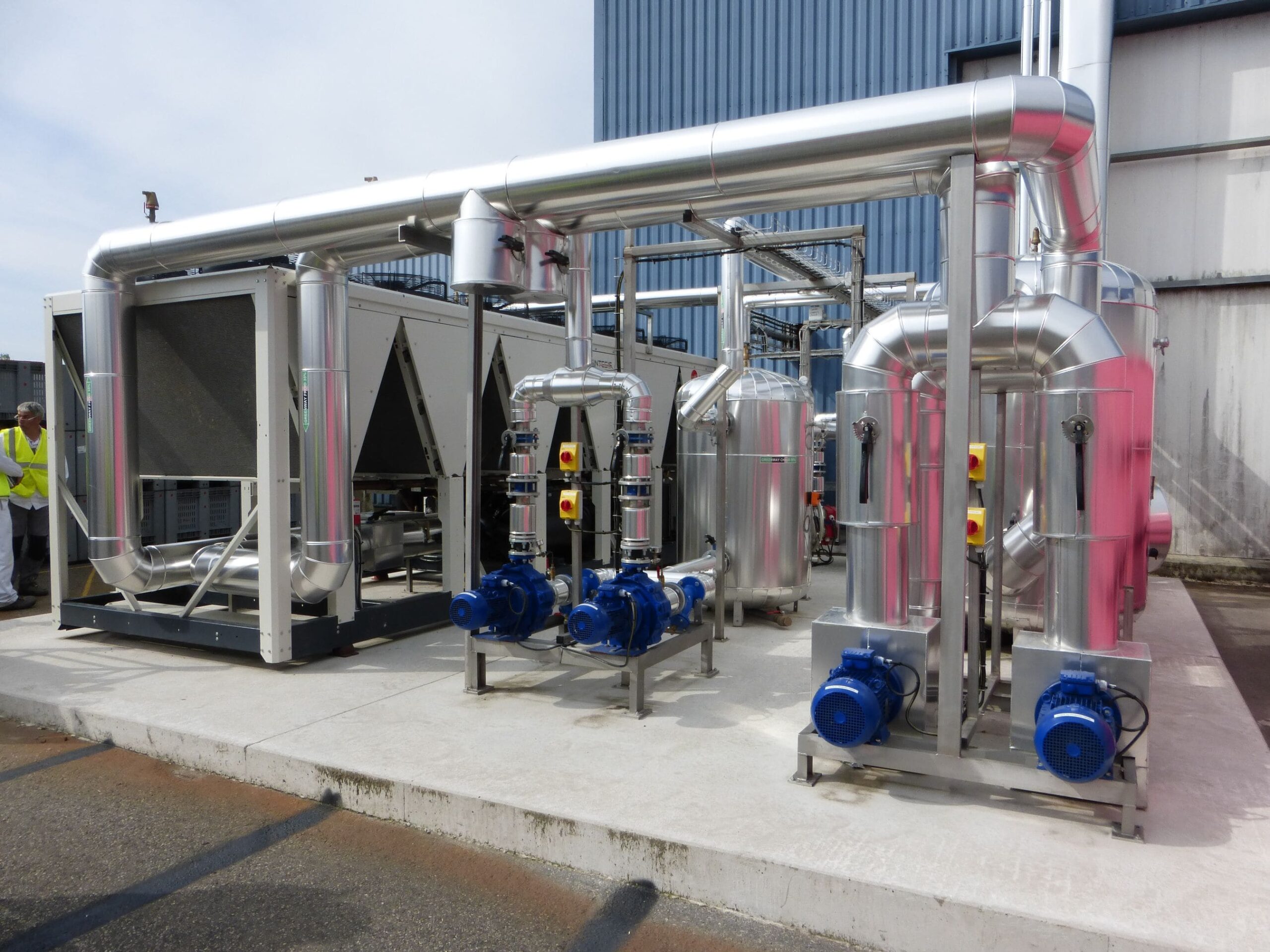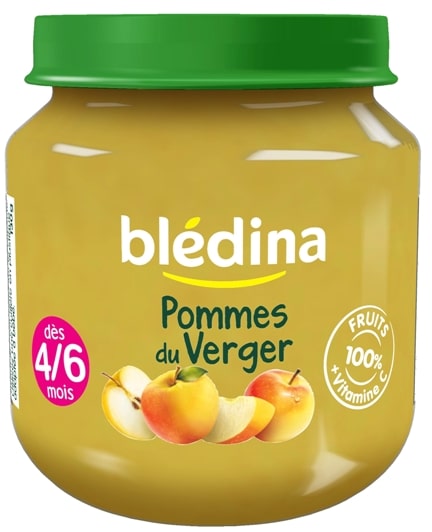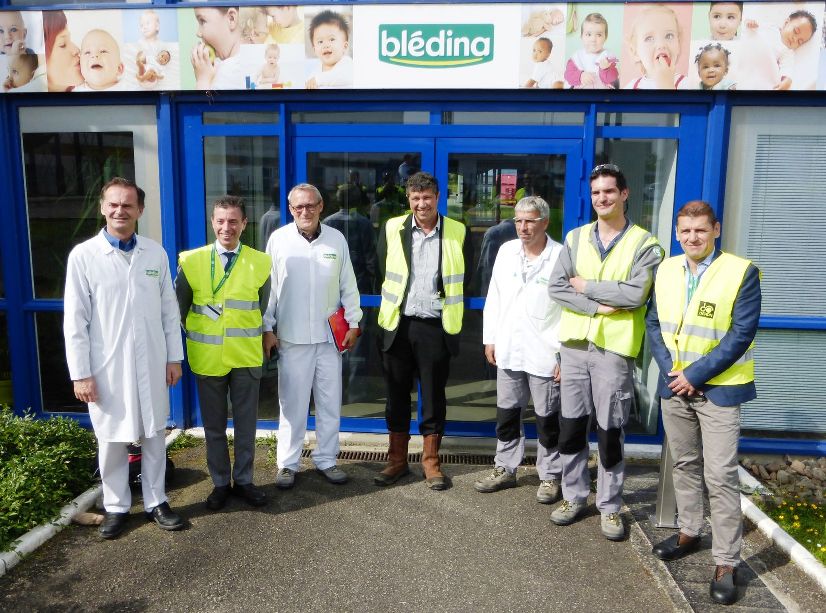An important decision for the company
The Danone group is a global leader in the food industry. Climate change is having a significant impact on the natural cycles that influence the food system. The group has both a responsibility and a vested interest in contributing to the fight against climate change, by helping to establish a “carbon-free” economy.
To achieve this, Danone measures its “carbon footprint” across its entire value chain. In other words, at its own level (logistics operations, packaging, etc.) and that of its suppliers (agricultural holdings, etc.), but also for consumers and local communities.
Frédéric Lebas, Director of the Blédina site in Brive-la-Gaillarde in the south-west of France, advises us that the group has set itself a mission “to bring health through food to as many people as possible”. He explains “We are committed to achieving long-term zero net carbon through solutions co-created with our partners“.
Blédina wishes to adopt the same approach for the replacement of their refrigeration systems that run on R-22, choosing CO2 for sub-zero refrigeration and a cooling unit for above-zero refrigeration, a solution proposed by the MCI installation engineer.

“There is no hazard symbol on the Greenway Neo® label”
When replacing the refrigeration system on the Brive-la-Gaillarde site, Nicolas Tomaz, a Project Manager at Blédina, looked for a fluid that could contribute to reducing the site’s carbon footprint. He approached Climalife, who he knew to be a producer of heat transfer fluids based on natural and renewable raw materials. After analysis of the customer’s requirements, and relying on its expertise in the field of heat transfer fluids, Climalife recommended the use of Greenway® Neo and contacted MCI for technical data.
Another advantage of Greenway® Neo is that it is highly biodegradable, with very little impact on the environment. Nicolas Tomaz explains “Our goal was to replace R-22 with the most environmentally-friendly and energy-efficient fluids”.
All products entering the Brive site are inspected in accordance with strict specifications. The use of Greenway Neo was immediately approved and authorised by the quality department, who observed that “the safety data sheet shows no hazard warning or symbol on the label”.
One other aspect played a significant role. “We also chose Greenway® Neo for its performance as a heat transfer fluid“, recalls Nicolas Tomaz. Due to Greenway®’s low viscosity, the site opted for smaller KSB pumps, thereby enabling significant energy savings: “A reduction in pressure loss of almost 30%, which is impressive”.
Nicolas Tomaz explained that “this was an excellent surprise, and as a customer, we are delighted“.
Beyond the choice of heat transfer fluid, a complete technical solution
Charles Fernandez is “Energy and General Services Manager” at Blédina. He recalls that “The Danone specifications were extremely demanding“, in compliance with the ISO 14 001 and 50 001 standards (environmental management system and energy management system).
For his part, Xavier Mercusot, sales manager at MCI, was proud to have been able to provide technical solutions to meet his customer’s performance, innovation and environmental requirements, “while respecting tight deadline constraints“.
To replace the R-22 cooling units, which cooled the above-zero cold rooms (+2/+4°C) and (-4°C) a sub-zero cold storage room (-20°C), MCI and Blédina chose Greenway® Neo and CO2 for its GWP of 1 and its ODP of 0.
Above-zero cooling was carried out using a Trane unit running on R-134a, with a power capacity of 268 kW at -6°C and a Greenway® Neo secondary refrigerant circuit, with heat recovery from the condensation from this unit. The heat recovery produces hot water for defrosting at +30°C. This chiller also ensures sub-zero circuit condensation through a cooling unit using CO2, with a power capacity of 127 kW at -18°C.
They also worked on the variable hydraulic distribution flow rate, chose Belimo self-regulating valves and a speed variation on compressors, ventilation and pumps. Finally, instrumentation and complete supervision enabling the system’s COP and consumption to be monitored were implemented.
Blédina puts its trust in MCI
A specialist in refrigeration, climate control engineering and energy performance, MCI has been supporting its customers for over 60 years in the design, installation and maintenance of their equipment.
With its 46 branches and offices located throughout France, MCI offers a wide range of solutions and services tailored to its customers’ needs in terms of energy performance, monitoring, regulations, and so on.

Danone has four businesses:
The production and marketing of fresh dairy products, water, early life nutrition and medical nutrition.
Present in over 130 markets, Danone’s turnover in 2014 was 21.1 billion euros, and the group has a portfolio of international brands (Activia, Actimel, Danette, Danino, Danio, Evian, Volvic, Nutrilon/Aptamil, Nutricia) and local brands (Prostokvashino, Aqua, Bonafont, Mizone, Blédina, Cow & Gate, Dumex).

From left to right: Fréderic Lebas, Blédina Plant Director – Christophe Morote, Climalife Business Director – Stéphane Deflandre, Blédina Maintenance and New Works Manager – Xavier Mercusot, MCI Sales Manager – Charles Fernandes, Blédina Energy and General Services Manager – Nicolas Tomaz, Blédina Maintenance and New Works Technician – Daniel Dias, Climalife Key Account Manager.

